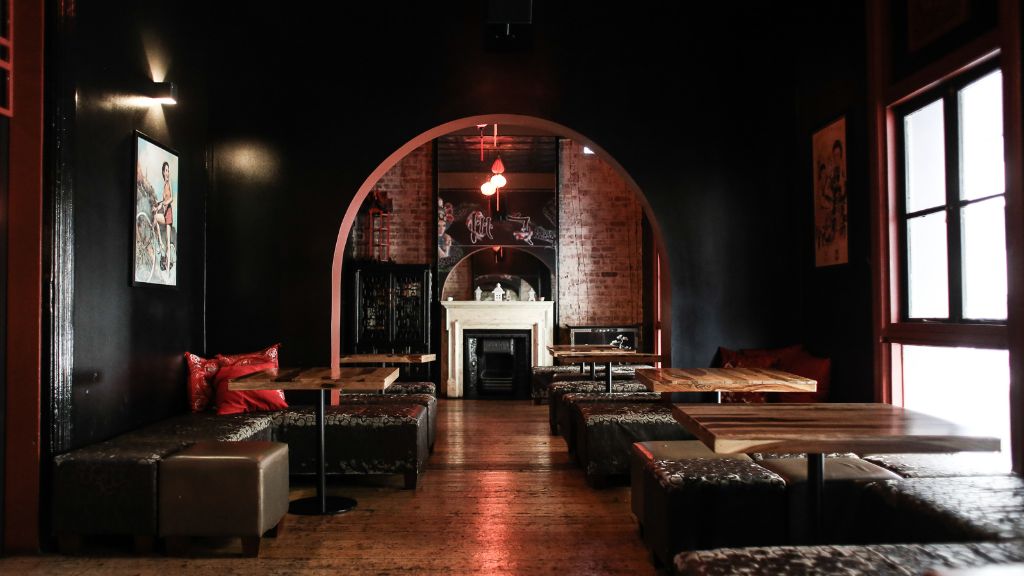Estimated reading time: 8 minutes
Table of contents
Cliff Notes: Steps to apply for a Michigan cannabis lounge license
Objective: Understand the step-by-step licensing process to obtain a Michigan cannabis lounge license and the application documents required.
Key Components:
- Michigan licenses “Designated Consumption Establishments” for on-site cannabis use.
- A two-step licensing process is required: prequalification and full application.
- Local municipal approval is mandatory before applying at the state level.
- No on-site cannabis sales are allowed; patrons must bring legally obtained cannabis.
- Strict air filtration, security, and staff supervision rules apply.
- Alcohol is prohibited; lounges must keep cannabis areas separate from sales zones.
Hiring a Michigan cannabis consultant helps ensure licensing success and full compliance with MRA regulations. Learn more about our Michigan cannabis consulting services or Book your Complimentary Consultation today.

Introduction
Michigan law explicitly recognizes and licenses cannabis “Designated Consumption Establishments.” These are commercial venues where adults 21+ can legally consume cannabis products on-site. The Michigan Marijuana Regulatory Agency (MRA) issues Consumption Lounge Licenses to qualified entities. Pursuant to state rules (MRTMA and R 420.21(3)), any person or business that allows on-site cannabis use in exchange for a fee or membership must hold this license. Under Michigan’s framework, the consumption license does not authorize retail sales – patrons must bring their own cannabis, or partner with a microbusiness that sells on adjacent premises.
Step-by-Step Licensing Process:
Opening a Michigan cannabis lounge requires navigating a multi-phase regulatory process designed to ensure legal compliance, community alignment, and consumer safety. Below is a breakdown of the official steps you’ll need to complete—from entity prequalification to final inspection—to secure your Designated Consumption Establishment License through the Michigan Cannabis Regulatory Agency.
1. Entity Prequalification
Michigan’s two-step application process begins with prequalification. The main applicant entity (e.g. LLC) must file a Prequalification Application (with identity, ownership, background disclosures) and pay a nonrefundable $3,000 application fee. All principals undergo fingerprinting and background checks. The MRA will only accept applicants in good legal standing (e.g. no recent drug felony).
2. Municipal Approval
Obtain local support. The local municipality must explicitly allow consumption lounges, and most require a zoning permit (often in commercial or industrial zones) before you can apply for the state license. The Village of Calvin example (2000 people) made headlines as the first to license a consumption lounge, but any township could follow their lead.
3. License Application
After prequalification, submit the actual Licensing Application for a Designated Consumption Establishment. This includes site plans, floor plans, security plan, ventilation strategy, staffing plan, and proof of insurance. Our full service Michigan cannabis consulting experts can guide the process. The application must detail how the lounge is separated from any retail part: for instance, if co-located with a microbusiness, there must be a solid wall or door ensuring that sales and consumption areas are distinct.
4. Inspection and Approval
The MRA will review your application. They conduct a background check for all officers and look for compliance with Rule 21 of the License Rules. If approved, you’ll pay the license fee and receive a Consumption Lounge license. Now you can begin construction/renovation under local permits.
Operational Requirements
Michigan’s rules require specific safeguards: a secure, dedicated consumption room (smoking/vaping), robust air filtration (30+ air changes per hour to outdoors) and separate HVAC so smoke doesn’t leak into non-smoking areas. Signage must warn of secondhand smoke. Staff must monitor the lounge at all times; at least one employee should work only in the consumption area to supervise. Employees over 21 will need a Medical or Adult-Use agent registration; if they sell any merchandise, an additional license (e.g. if selling paraphernalia). Over-intoxication protocols should be in place (like offering water or calling a ride if needed).
Compliance Challenges
Key points to watch:
- No sales on site. The law forbids sales by the lounge – Michigan enforces this strictly. If you want to host sales, you must either hold a separate retailer or microbusiness license in an adjacent space.
- Michigan also mandates records to prove every cannabis at the lounge came from legal sources.
- Failing to segregate the lounge from other areas or letting under-21s in would violate the license conditions.
- City governments (like Detroit) may have additional local rules.
- Security cameras covering the entire lounge, alarm systems, and entry logs are standard.
Why Hire a Cannabis Consultant?
The Michigan cannabis lounge license comes with unique challenges—zoning approvals, ventilation requirements, co-location limitations, and strict operational standards. One small oversight can delay your opening or risk your compliance standing. That’s where a specialized cannabis consultant adds real value.
At Catalyst BC, we bring deep expertise in Michigan’s regulatory landscape and hands-on experience guiding businesses through every stage of the licensing journey. From pre-application readiness and municipal coordination to facility design and final inspection prep, our end-to-end consulting services help you avoid pitfalls, speed up approvals, and launch with confidence. Let us streamline the process so you can focus on creating an exceptional on-site cannabis experience.
Learn more about our Michigan cannabis consulting services or Book your Complimentary Consultation today.
Michigan Cannabis Lounge FAQs
Yes. If you charge any entry fee or membership and allow on-site use, Michigan law says you must have a designated consumption establishment license. Operating without one is illegal.
Possibly – rule 21 allows co-location. A dispensary or microbusiness may obtain a consumption license and attach a lounge adjacent to the shop, as long as it’s separated by walls/doors.
Yes, but if you include smoking, you must have a sealed smoking room with heavy-duty exhaust and filters. Many lounges simply permit vaping only to reduce ventilation costs.
24/7 video surveillance of all areas, secured entrances, and visitor logs are required. The MRA will require alarms and possibly on-site security personnel depending on your plan. Our Michigan Cannabis Consulting experts can guide you through the security requirements.
You may sell non-cannabis products (snacks, drinks, apparel) if you obtain a separate Adult-Use or Retailer license, or partner with a microbusiness. Remember, no marijuana sales in the lounge itself.
No. Having an alcohol license and a cannabis lounge is not permitted under the Marijuana Regulatory Agency’s rules.
The prequalification fee is $3,000 (non-refundable). Expect an initial license fee (likely around $1,000 or more, similar to dispensaries) once your application is approved.
No. Michigan bars and city councils must agree. Check local ordinances and seek a zoning special use permit. If your city bans lounges, the state will not approve a license there.
Definitely. Michigan’s DCE license is unique, and Catalyst BC’s Michigan cannabis consultants can help with the MRA application, local government liaison, and setting up your facility for inspection.
Navigating the Michigan cannabis lounge space is complex—one misstep can delay your opening or jeopardize your license. A specialized Cannabis Consultant brings deep regulatory knowledge, operational best practices, and hands-on project management.
From initial concept and licensing to grand opening and ongoing compliance, Catalyst BC’s end-to-end Michigan Cannabis Consulting services ensure you launch faster, stay compliant, and maximize profitability.
Additional Resources
Free eBooks For Cannabis Business Success
Explore Our Articles
cannabis applications Cannabis Bar Cannabis Business Optmization cannabis careers Cannabis Compliance Cannabis Consumption Cannabis Consumption Bar Cannabis Inventory Management Systems Cannabis Investors cannabis jobs Cannabis Legalization cannabis licensing Cannabis Lounge cannabis marketing Cannabis Operational Procedures cannabis outreach Cannabis Regulations Cannabis Security Cannabis Software Cannabis Startup Cannabis Supply Chain Cannabis Technology Colorado controlled environment agriculture Cultivation cultivation facility Dispensary Design facility design Financial Planning HVAC HVACD Iowa Kansas Legal Update Legislation Medical Cannabis Minnesota Natural Medicine Nebraska New York Odor Control Oregon Psilocybin Psychedelics Recreational Cannabis
Latest Articles
- Missouri Cannabis Licensing & Business Opportunities 2026Missouri has established itself as the premier success story for cannabis in the Midwest, evolving from a standard medical regime to a high-volume adult-use market that exceeded $1.52 billion in annual sales in 2025. As the market enters the 2026–2027 biennium, the landscape is shifting from rapid expansion toward operational maturation and specialized entry.
- North Carolina Cannabis Licensing & Business Opportunities 2026North Carolina remains one of the final significant jurisdictions in the United States without a comprehensive medical or adult-use cannabis program. However, the 2026–2027 biennium is projected to be the most consequential period in the state’s cannabis history. Driven by the formation of the North Carolina Advisory Council on Cannabis and an impending federal “hemp cliff,” the state is moving from a period of passive prohibition toward a structured, albeit highly restrictive, regulatory framework.
- Nebraska Cannabis Licensing & Business Opportunities 2026Nebraska is entering the 2026–2027 biennium at a historic crossroads. Following the 71% voter approval of Initiatives 437 and 438 in late 2024—the largest margin for a medical cannabis initiative in U.S. history—the state is currently standing up its first regulated medical infrastructure.
- Florida Cannabis Licensing & Business Opportunities 2026Florida represents the most capital-intensive and professionally structured cannabis market in the nation. As of 2026, the state is at a crossroads: it is both expanding its mature medical program and preparing for a potential constitutional shift toward universal adult-use access. On November 3, 2026, Florida voters will decide on the Marijuana Legalization Initiative (Amendment 3). Passing this requires a 60% supermajority—a high threshold, but one that polls suggest is within reach.
- Virginia Cannabis Licensing & Business Opportunities 2026As Virginia transitions from its current “possession-only” model toward a fully regulated retail market, the 2026–2027 biennium represents a once-in-a-generation window for market entry. Unlike the vertically integrated “medical-only” regimes of the past, Virginia’s upcoming framework focuses on decentralization, specifically architected to favor small Virginia-based operators over large multi-state corporations.
- Minnesota Cannabis Licensing & Business Opportunities 2026Minnesota is currently undergoing a transformative shift in its cannabis landscape, moving from a semi-regulated hemp-derived market toward a fully comprehensive adult-use framework. Overseen by the Office of Cannabis Management (OCM), the 2026–2027 biennium represents the critical “enforcement phase” where temporary registrations sunset and permanent, merit-based licenses define the market’s long-term leaders.











